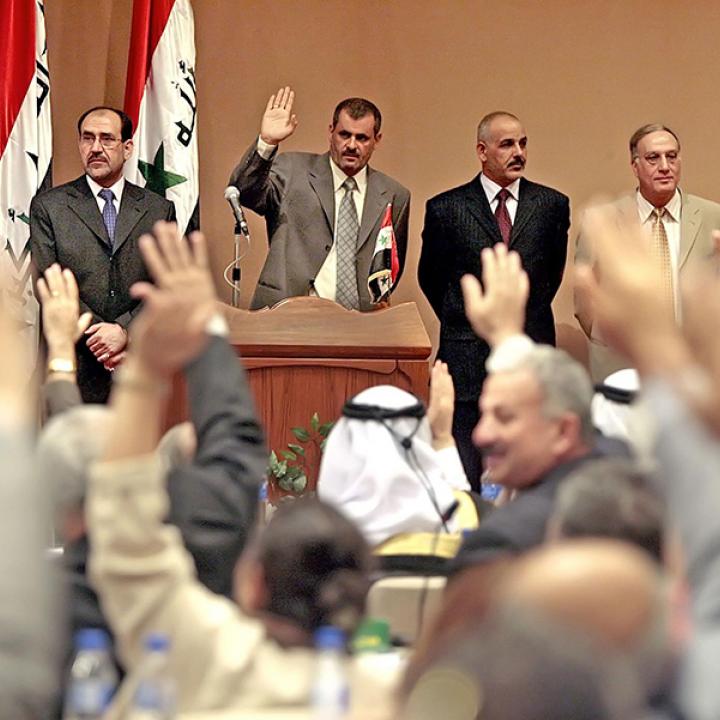

New opposition-led legislation on term limits gives Washington an opening to press Baghdad on improving relations with the Kurds.
On January 27, the Iraqi Council of Representatives passed legislation to limit presidents, prime ministers, and parliamentary speakers to two terms of office. Although the country's Supreme Court may soon strike the legislation down, the opposition to Prime Minister Nouri al-Maliki has scored a notable and encouraging victory, demonstrating cohesion throughout the process. In contrast, Maliki's supporters were divided and may have been signaling him to adopt a less confrontational stance.
The opposition bloc -- composed of Iraqi Kurds, the predominately Sunni Arab Iraqiyah list, Muqtada al-Sadr's followers, and the Shiite-led Islamic Supreme Council of Iraq (ISCI) -- introduced the legislation and rushed it through two readings in parliament in less than two months, which is record time by Iraqi standards. For yesterday's session, the bloc pulled together an impressive 170 votes, surpassing the 163-seat threshold to pass legislation. Only 70 legislators voted against the bill or abstained.
The high opposition turnout prevented Maliki's State of Law Alliance (SLA) from collapsing the session with a walkout, a favorite method of breaking quorum. The opposition's new cohesion can be directly attributed to Maliki's ill-fated arrest campaign against Sunni finance minister Rafi al-Issawi's bodyguards in mid-December, which continues to generate much furor in the Sunni Arab community.
The apparent Shiite schism in the parliament was even more noteworthy, with forty Sadrist and fourteen ISCI legislators voting for the term limit. Perhaps a dozen SLA members were absent, which is a surprisingly high number for such a critical vote and may indicate a slight fraying of Maliki's core support. In all, only 242 of 325 legislators were present, with many Shiite independents and factions (e.g., the Islamic Fadhila Party; the Badr Organization) absent rather than at the prime minister's side.
Other Shiite actors have also been signaling disapproval to Maliki. Shiite religious leaders such as Grand Ayatollah Ali al-Sistani have been involved in backing him down from a range of provocative escalations, including a threatened suspension of parliament, a mooted transfer of predominantly Shiite army divisions to the Kurdish north, and a suspension of Baghdad's monthly financial disbursements to the Kurdistan Regional Government (KRG). Moreover, the active participation of Sadrist and ISCI supporters suggests that Iran is warning him against further erratic behavior that could threaten Shiite unity and upset the sect's dominance of Iraqi politics.
For U.S. policymakers, the term-limit decision represents both a challenge and an opportunity. The Maliki-leaning Supreme Court will most likely rule that the legislation cannot enter statute because it was not proposed by the cabinet. This would further frustrate the opposition, underlining the difficulties of achieving peaceful change through legal mechanisms and, perhaps, adding fuel to the fire of ongoing Sunni protests. It would also exacerbate the ambiguity surrounding next year's planned national elections and add to the already-considerable risk of a violent constitutional crisis afterward.
At the same time, the shock delivered to Maliki could present an opportunity for Washington. Although he is usually more prone to counterattack than defend, he will be feeling enormous pressure in the wake of yesterday's vote. This is one of a number of fleeting moments when U.S. fellowship with the isolated prime minister could translate into increased influence.
In particular, Washington should firmly press Maliki to fully support the U.S.-backed Combined Security Mechanisms for reducing the risk of confrontation between Baghdad and the KRG in disputed areas. It should also push him to resume negotiations on the hydrocarbons framework law and jumpstart the cost-recovery mechanism for KRG oil contractors by greatly increasing the program's allowance in the draft 2013 budget. Finally, it should press him to back an amended version of the term-limit legislation that would come into force immediately after the next prime minister is ratified, and that includes a form of internationally guaranteed immunity from prosecution for former presidents, prime ministers, and speakers of parliament.
Those who still view Maliki as Iraq's best hope can take comfort from the possibility that amended legislation would, in theory, allow him a third term. Those who fear his intentions will be reassured that a term limit of any kind will weaken his standing and, perhaps, make his reappointment in 2014 less likely.
Michael Knights is a Boston-based Lafer fellow with The Washington Institute.


